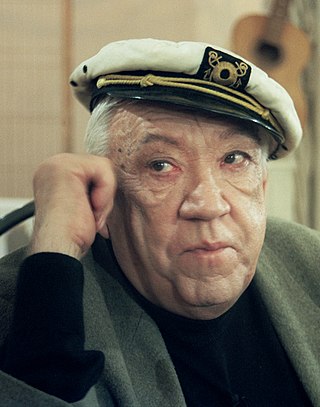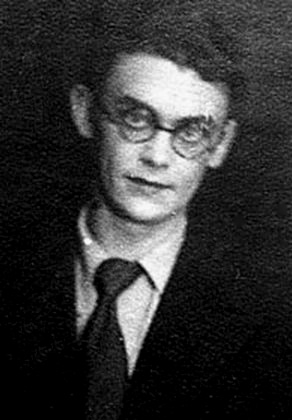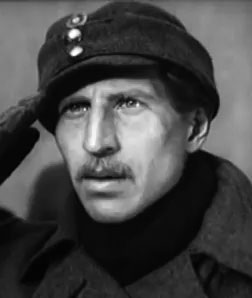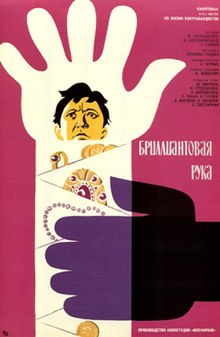
The cinema of the Soviet Union includes films produced by the constituent republics of the Soviet Union reflecting elements of their pre-Soviet culture, language and history, albeit they were all regulated by the central government in Moscow. Most prolific in their republican films, after the Russian Soviet Federative Socialist Republic, were Armenia, Azerbaijan, Georgia, Ukraine, and, to a lesser degree, Lithuania, Belarus and Moldavia. At the same time, the nation's film industry, which was fully nationalized throughout most of the country's history, was guided by philosophies and laws propounded by the monopoly Soviet Communist Party which introduced a new view on the cinema, socialist realism, which was different from the one before or after the existence of the Soviet Union.

Andrei Aleksandrovich Mironov was a Soviet and Russian stage and film actor who played lead roles in some of the most popular Soviet films, such as The Diamond Arm, Beware of the Car and Twelve Chairs. Mironov was also a popular singer.

Yuri Vladimirovich Nikulin was a Soviet and Russian actor and clown who starred in many popular films. He is best known for his roles in Leonid Gaidai's comedies, such as The Diamond Arm and Kidnapping, Caucasian Style, although he occasionally starred in dramatic roles and performed in Moscow Circus.

Anatoli Dmitriyevich Papanov was a Soviet and Russian actor, drama teacher, and theatre director at the Moscow Satire Theatre where he served for almost 40 years. A prominent character actor, Papanov is mostly remembered for his comedy roles in a duo with his friend Andrei Mironov, although he had many dramatic roles as well. As a voice actor, he contributed to over one hundred cartoons. He was named People's Artist of the USSR in 1973 and awarded the USSR State Prize posthumously.

Leonid Iovich Gaidai was a Soviet comedy film director, screenwriter and actor who enjoyed immense popularity and broad public recognition in the former Soviet Union. His films broke theatre attendance records and were some of the top-selling DVDs in Russia. He has been described as "the king of Soviet comedy".

Beware of the Car is a 1966 Soviet crime comedy drama film directed by Eldar Ryazanov, based on a screenplay by Emil Braginsky and produced by Mosfilm. It stars Innokenty Smoktunovsky, Oleg Yefremov, Andrei Mironov and Anatoli Papanov, among others. Beware of the Car is recognized as a satire of the film noir genre, highly unusual in Brezhnev-era society. It is credited for launching Soviet political satire as a film genre, typified by Ryazanov's work.

Noyabrina Viktorovna Mordyukova was a Soviet and Russian actress and People's Artist of the USSR (1974). She was the star of films like director Denis Yevstigneyev's Mother and Nikita Mikhalkov's 1980s hit Family Relations. She one of the most outstanding Russian film actresses of the 20th century.

Prisoner of the Caucasus or Shurik's New Adventures is a 1967 Soviet romantic musical comedy film dealing with a plot revolving around bride kidnapping, an old tradition that used to exist in certain regions of the Northern Caucasus.

Operation Y and Shurik's Other Adventures is a 1965 Soviet slapstick comedy film directed by Leonid Gaidai, starring Aleksandr Demyanenko, Natalya Seleznyova, Yuri Nikulin, Georgy Vitsin and Yevgeny Morgunov. The film consists of three independent parts: "Workmate", "Déjà vu" and "Operation Y". The plot follows the adventures of Shurik, the naive and nerdy Soviet student who often gets into ludicrous situations, but always finds a way out very neatly.

Svetlana Afanasyevna Svetlichnaya was a Soviet and Russian actress most famous for her role in The Diamond Arm (1968).
Bootleggers or Moonshiners is a 1961 Soviet short comedy film directed by Leonid Gaidai.

Shirli-myrli is a 1995 farce comedy film of the early post-soviet era directed by Vladimir Menshov. Centered around a pursued con man, who stole a huge diamond, the movie, among other things, satirizes chauvinism, antisemitism and other ethnic tensions in the 1990s Russia. Valery Garkalin plays multiple roles as identical twins who were raised believing they belong to different cultures and races and used to look down on each other's.

Sportloto-82 is a 1982 Soviet action adventure comedy film directed by Leonid Gaidai. The film stars Algis Arlauskas, Svetlana Amanova, Mikhail Pugovkin, Mikhail Kokshenov and Nina Grebeshkova. It was filmed in Soviet Union. It was also one of the all-time leaders at the Soviet box office with over 55,000,000 theatre admissions in the Soviet era.

Sergey Nikolayevich Filippov was a Soviet and Russian film and stage actor and comedian, best known for his parts in films Adventures of Korzinkina (1941), The Night Patrol (1957) and the adaptation of Ilf and Petrov's classic The Twelve Chairs (1971), which granted him the People's Artist of the RSFSR title in 1974.

The Twelve Chairs is a 1971 Soviet comedy film directed by Leonid Gaidai. It is an adaptation of Ilf and Petrov's 1928 novel The Twelve Chairs.

Give Me a Book of Complaints (Russian: Дайте жалобную книгу, romanized: Dayte zhalobnuyu knigu is a 1965 Soviet comedy film directed by Eldar Ryazanov.

Come Here, Mukhtar! is a 1965 drama film directed by Semyon Tumanov.

Stanislav Yulianovich Chekan was a Soviet actor of theater and cinema, known primarily for his blue-collar manly appearance, and character actor roles of a stereotypical "big guy".
Absolutely Seriously is a 1961 Soviet comedy anthology film directed by Eldar Ryazanov, Naum Trakhtenberg, Eduard Zmoiro, Vladimir Semakov and Leonid Gaidai. The best known novella is Dog Barbos and Unusual Cross which is often screened separately.
The Ballad of Bering and His Friends is a 1970 Soviet adventure film directed by Yuri Shvyryov.
















